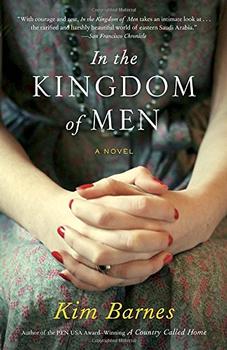Summary | Excerpt | Reviews | Beyond the Book | Readalikes | Genres & Themes | Author Bio

A Novel
by Kim BarnesJanuary 1, 1970
Rome, Italy
Here is the first thing you need to know about me: I'm a bare-foot girl from red-dirt Oklahoma, and all the marble floors in the world will never change that.
Here is the second thing: that young woman they pulled from the Arabian shore, her hair tangled with mangrove - my husband didn't kill her, not the way they say he did.
There is so much, now, that you will want to know, that you believe I will be able to tell you. If not, why even begin?
Because I can't stop thinking of her, not yet eighteen, perfectly, immutably silent, just as they wanted her to be. It is the dream of her face shining up from the sea like a watery moon that still haunts me. Not even her mother will speak her name.
Because, among these Roman people whose language flows like a river over rocks, my own name drops heavy as a stone, no husband, no father, no family or tribe to tether me.
Because I don't know who I am anymore and have forgotten who it was I meant to be.
Let me tell it from the beginning, then, remember the truths of my own story so that I might better bear witness to hers, trace the threads to that place where our lives intertwined - one of us birthed to iron-steeped clay, the other to fallow sand, each of us brought to this place by men born of oil.
Chapter One
In the beginning - these three words my daily bread, recited at the kitchen table in our shack in Shawnee, the Bible open in front of me. Before then, just as the Korean War was beginning, I remember my mother humming honky-tonk as she fried spuds for our dinner, two-stepping to the table in an imaginary waltz. She was the daughter of a Methodist circuit preacher who extolled separation from the world, and his wife, who bowed her head in submission and held her tongue even as she secreted away the money she made selling eggs, a penny at a time added to the sock hidden beneath the nest of her beloved Rhode Island Red, a hen so fierce and prone to peck that my grandfather gave it wide berth.
My mother loved to tell the story: how my grandmother scraped and saved until she had enough for a train ticket back to her family in Pawhuska, then rose one morning, fixed her husband a big pot of pork hocks and brown beans - enough to last him a week - made bacon and extra biscuits so he wouldn't have to go without breakfast, ironed his handkerchiefs and starched his shirts, then told him that one of the ladies of the church was having female troubles and needed her care. My grandmother walked out the door with a bundle of biscuits under one arm, her infant daughter in the other, went straight to the train station, didn't even leave a note. My grandfather refused to divorce her, would never forgive the way she had deceived him, but maybe he should have known - the way that women have always lied, risking their souls to save their sorry lives.
It was eighteen years later when my father, two weeks hitchhiking Route 66 and still no job, came looking for work at the Osage County Fair and first laid eyes on my mother - a rodeo princess pitching cow chips for charity. He must have fallen in love with her right then - the way she could clean up pretty as a new nickel or muck down on her knees in manure, that sunshine smile never breaking. She brought him home to meet her mother, and I like to imagine that moment: the three of them at the table, the late light warm through the window, and all of them laughing at their good fortune - to have found one another, to share the sweet fruit of that pie.
My parents were married that winter, and the next winter, I was born. When my father was drafted, my mother and I moved in with my grandmother to wait out the war. Two years later, the official from the State Department arrived, telling how my father had died in the Home-by-Christmas Offensive, that the president was sorry, as was the nation. My only memories of him reside in the stories my mother told.
Excerpted from In the Kingdom of Men by Kim Barnes. Copyright © 2012 by Kim Barnes. Excerpted by permission of Knopf, a division of Random House, Inc. All rights reserved. No part of this excerpt may be reproduced or reprinted without permission in writing from the publisher.
Your guide toexceptional books
BookBrowse seeks out and recommends the best in contemporary fiction and nonfiction—books that not only engage and entertain but also deepen our understanding of ourselves and the world around us.